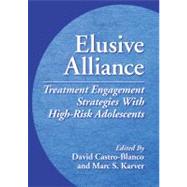
Note: Supplemental materials are not guaranteed with Rental or Used book purchases.
Purchase Benefits
What is included with this book?
| Contributors | p. vii |
| Preface | p. ix |
| Introduction: The Problem of Engaging High-Risk Adolescents in Treatment | p. 3 |
| Engagement in Psychotherapy: Factors Contributing to the Facilitation, Demise, and Restoration of the Therapeutic Alliance | p. 21 |
| The Alliance in Adolescent Therapy: Conceptual, Operational, and Predictive Issues | p. 59 |
| Involvement Shifts, Alliance Ruptures, and Managing Engagement Over Therapy | p. 95 |
| TEEN: Techniques for Enhancing Engagement Through Negotiation | p. 123 |
| Engaging Adolescents With Disruptive Behavior Disorders in Therapeutic Change | p. 139 |
| Engagement of Adolescents in Cognitive-Behavioral Therapy for Obsessive-Compulsive Disorder | p. 159 |
| Engaging Suicidal Multiproblem Adolescents With Dialectical Behavior Therapy | p. 185 |
| Treatment Engagement With Adolescent Suicide Attempters | p. 207 |
| Conclusions: Looking Ahead-Future Directions in Treatment Engagement With High-Risk Adolescents | p. 227 |
| Index | p. 243 |
| About the Editors | p. 253 |
| Table of Contents provided by Ingram. All Rights Reserved. |
The New copy of this book will include any supplemental materials advertised. Please check the title of the book to determine if it should include any access cards, study guides, lab manuals, CDs, etc.
The Used, Rental and eBook copies of this book are not guaranteed to include any supplemental materials. Typically, only the book itself is included. This is true even if the title states it includes any access cards, study guides, lab manuals, CDs, etc.